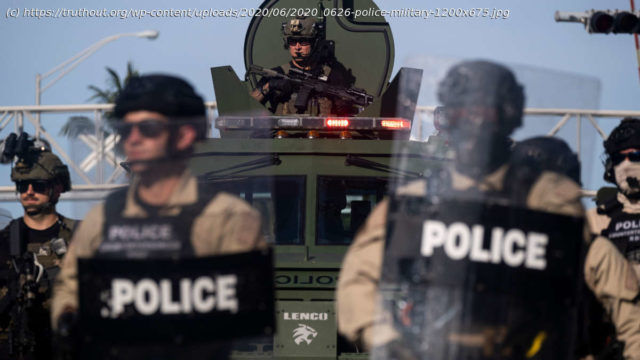Renaming military bases that honor white supremacists is an empty gesture if it’s tied to increasing military budgets.
In the wake of the global protests against the murder of George Floyd in Minneapolis, activists have begun to reclaim public spaces by destroying statues of conquerors, slave traders, white supremacists and colonizers. In the United States alone, protesters have torn down and defaced statues of Confederate generals in Richmond, Virginia; Nashville, Tennessee; and Montgomery, Alabama; and statues of Christopher Columbus in St. Paul, Minnesota, and Boston, Massachusetts. Globally, sympathetic protesters in Bristol, U. K., threw a statue of Edward Colston — a prominent 17th-century slave trader — into the River Avon, while activists in Belgium defaced a statue of King Leopold II — the founder of the Congo Free State — prompting city officials to remove it.
In response, the liberal intelligentsia and a bipartisan coalition of congressional representatives have offered their own efforts to confront the racist history of the United States. In a recent opinion piece, The New York Timeseditorial board charged the U. S. military with celebrating white supremacy, calling for the renaming of military bases honoring Confederate generals. On June 10, the Senate Armed Services Committee approved an amendment offered by Sen. Elizabeth Warren to remove the names of Confederate officials from U. S. military assets in three years, a measure that would include renaming military bases as well as aircraft, ships, weapons and streets. In the House, Speaker Nancy Pelosi has supported a similar bipartisan amendment to the $740 billion defense spending bill, while also calling for the removal of 11 Confederate statues from the Capitol.
There is no question that military bases named after Confederate generals should be renamed. But responding to the problem in this way while simultaneously expanding the military budget masks the global roots of structural racism in the United States. It neglects that racialized policing domestically is intricately connected to the exercise of U. S. international police power abroad. Several sociologists and historians have shown how counterinsurgency tactics developed to quell anti-colonial revolts boomeranged back to the metropole, influencing the tactics that urban police forces use to counteract the tactics of Black-led protest movements.
Calls to rename military bases exemplify what Aziz Rana calls “national security citizenship.” From Crispus Attucks fighting in the American Revolution to W. E. B. Du Bois’s call to “close ranks” and set aside Black grievances in support of U. S. entry into World War I to the demands of the NAACP to desegregate the military, Black Americans are frequently forced to align their demands for racial inclusion with the imperatives of the national security state.






